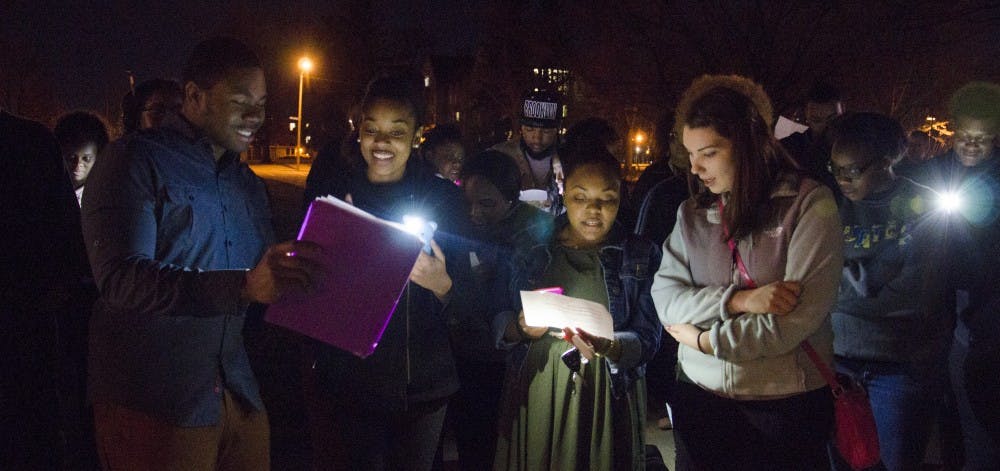A Ball State student leader finally had the chance to talk about the university’s silencing of multicultural organizations.
David Jones, current president of the Ball State Black Student Association, said at the Beneficence Dialogue March 31 that the executive board had its funding threatened for discussing the recent John R. Emens Award controversy with both the media and its members.
The restriction caused some tension with the organization's executive board and its members during a BSA forum.
“We were getting all the hate,” Jones said. “Since we have titles and we are an organization, people think, ‘They’re the people we go to. This is their fault,’ so we just had to stand there and take the heat because we couldn’t say anything.”
Jones was one of more than 100 people that came out to the L.A. Pittenger Student Center to take part in the student-demanded dialogue on race relations and cultural sensitivity on campus.
Plans for the discussion on March 31 sprung out of an email from Ball State President Paul W. Ferguson in response to students’ concern about lack of campus discussion on race.
Chris Taylor, Student Government Association chief of staff, wrote a letter asking for more active dialogue.
“I think the main thing for us was having this conversation in public and in front of the entire Ball State community, and I think this is a great start to having it,” Taylor said at the Hope and Healing ceremony at the Beneficence statue.
Ferguson and other administrators joined students in groups during two identical sessions where participants were encouraged to “not hold anything back.”
“A lot of events over this last week suggested that the nation, the state are struggling with some of the issues of diversity and we want to make a very clear statement here at Ball State University... is that we are truly committed to a diverse and inclusive community,” Ferguson said just before the first session split into groups.
Each group was assigned a facilitator who was tasked with taking notes on the issues that were brought up.
“I actually didn’t expect it to go like that,” Jones said. “But the fact that they broke us up into groups, …[the facilitators] were able to give us feedback after feedback. I think it was great dialogue.”
Ro Anne Royer Engle, director of the Multicultural Center, said they would compile the notes and look for trends in problems and solutions discussed.
One suggestion from one of the groups included unifying diversity offices on campus and regularly planning discussions on campus.
“I think the conversation is overdue,” said Nathaniel Thomas, president of the Ethnic Theatre Alliance. “This needs to take place every year, if not every semester.”
Cierra Hill, public relations director of BSA and a junior radiography and health science major, also said the university had a relatively slow response to the issues preceding the discussion.
“This is basically just a reaction to our reaction,” Hill said. “It took a while to get to this point and I don’t think it should have taken this long and I don’t think it should have blown up on social media like it did to get this.”
The ceremony followed the discussions and featured a performance by the Ball State Voice of Triumph Choir and poems from students. President of SGA Nick Wilkey also lead a recitation of the Beneficence Pledge, which includes a commitment to “respect and learn the differences in people, ideas and opinions.”
While the university has not yet said whether it will plan any additional discussions, Ferguson said it will be a priority for him to keep up dialogue.
“This is not an end tonight,” he said. “This is a beginning. An evolution. But I’m telling you here tonight that the dialogue continues and the relationship grows.”





